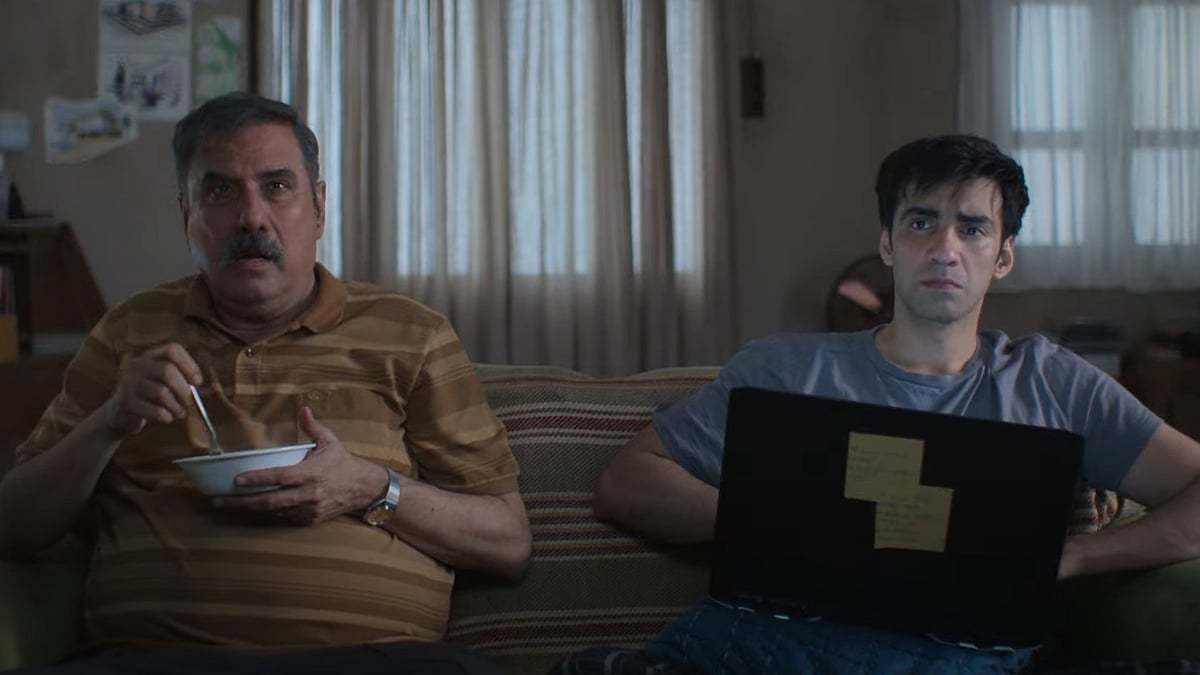The Mehta Boys Review: Refreshingly Tender Tale Bolstered by Superb Performances
'The Mehta Boys' is streaming on Prime Video.

advertisement
A father sits with his son and his partner in an intimate, posh Mumbai restaurant recalling the moment he knew his wife was ‘the one’ for him. The scene seems to vanish around you, though it stays on the screen – the viewer is transported from the restaurant to a sari shop. That is the power The Mehta Boys holds over you as a viewer, it’s transportive.
The story of a father and son with a fractured relationship isn’t novel; one might even assume the film would proceed in predictable ways but Boman Irani’s directorial debut sweeps you off your feet.
A still from The Mehta Boys.
Amay (Avinash Tiwary) is an architect in Mumbai who is struggling to find his footing at his company even as his colleague and partner Zara (a captivating Shreya Chaudhry) pushes him to do and be better. Two parallel threads run in Amay’s life – his company is trying to get a design approved for an important client and the events that follow the news of his mother’s passing.
Amay rushes home to meet his father Shiv Mehta (Boman Irani) and his sister Anu (Puja Sarup). In a few interactions, the script allows the audience to gain valuable insight into each character. And that’s one of the film’s biggest strengths – it’s writing (credited to Irani and Alexander Dinelaris). It becomes very obvious when writers understand the characters – it’s reflected in the things they say and the way they act and it makes for delightful cinema.
A still from The Mehta Boys.
This prowess is especially evident in the way Amay’s mother Shivani populates the film despite being mostly absent from the screen. ‘Death’ in both its inevitability and the permanence of the effect it leaves behind is a difficult aspect to write.
And Irani and Dinelaris choose to write death by writing about life – Shivani comes alive in her family’s memory. Shiv is tied to his family ‘home’ through Shivani – in a time when everything feels disorienting, that place roots him.
Anu, in an arresting performance by Puja Sarup, struggles to exist in the conflict between father and son, channeling her mother’s essence in the way she deals with the conflict; even in her absence, she relies on her mother’s effect on the family.
Avinash Tiwary in a still from The Mehta Boys.
The Mehta Boys isn’t trying to ‘resolve’ anything and, in doing that, it’s honest. It’s deeply rooted in its characters’ lives – the film’s objective isn’t to lead the audience to a feeling; it’s simply to observe. When the two Mehta men fight, the film observes, never taking a side. With this, it deepens the connection between filmmaker and viewer.
The fights aren’t just presented as that, we see how two men are struggling to relinquish control – how they project their own insecurities into these arguments because they don’t have the language to communicate. A father finds himself reflected in his son’s views of the typewriter. It makes the characters infuriating, especially because they still tug at your heartstrings.
A still from The Mehta Boys.
Irani’s performance is pitch-perfect. Even as he tries to be jovial and open up to new experiences, grief seeps out of his very pores. Something as simple as the inflections in his tone when he talks to Zara vs Amay makes it difficult to fault the actor. Tiwary matches his energy every step of the way, holding his ground in front of a veteran. In a way, his character is a balancing act – a man trying to grapple with rage and guilt while trying to be a good son, a good partner, and a good employee. Tiwary balances it well.
Then there’s Chaudhry. Her act is all about the chemistry she builds and I don’t mean to suggest that she doesn’t build her character well. In her interactions with Amay and Shiv, she creates a bridge between two people pushed apart by intergenerational trauma. She’s kind, attentive, and equally assertive – even in scenes not focused on her, she makes her presence known. She is a love interest, the friend, and a catalyst. Brilliant.
Shreya Chaudhry in a still from The Mehta Boys.
By making Amay an architect the film easily draws parallels between Mumbai of the past and the present and Amay’s relationship with his father. Form over function or form and function. Is glass and steel better than ornate windows? Is the typewriter better than the laptop? The old and the new clash in the film constantly and yet, predictably by now, the film doesn’t make too firm of a point in either direction. Any gap formed by the passage of time isn’t that easily resolved.
The Mehta Boys makes a very important distinction between empathy and pandering when it comes to its protagonists. When a filmmaker panders to their protagonist, they do a disservice to everyone involved but The Mehta Boys lets its characters be messy and frustrating and that’s what makes them hopelessly endearing.
Boman Irani in a still from The Mehta Boys.
The film isn’t perfect – some scenes do feel out of place and others could’ve lasted longer, leading to a deeper impact. This means that some threads feel unresolved because they never should’ve been there.
The cinematography by Krish Makhija captures both the city and the people on screen with the same sensitivity. The close-ups into characters’ faces when tensions rise, albeit repetitive, are effective in keeping the viewer’s attention on the ‘people’ on screen.
When a film seems to effectively bare its soul to you, holding its heart in its hands….how can you not reciprocate?